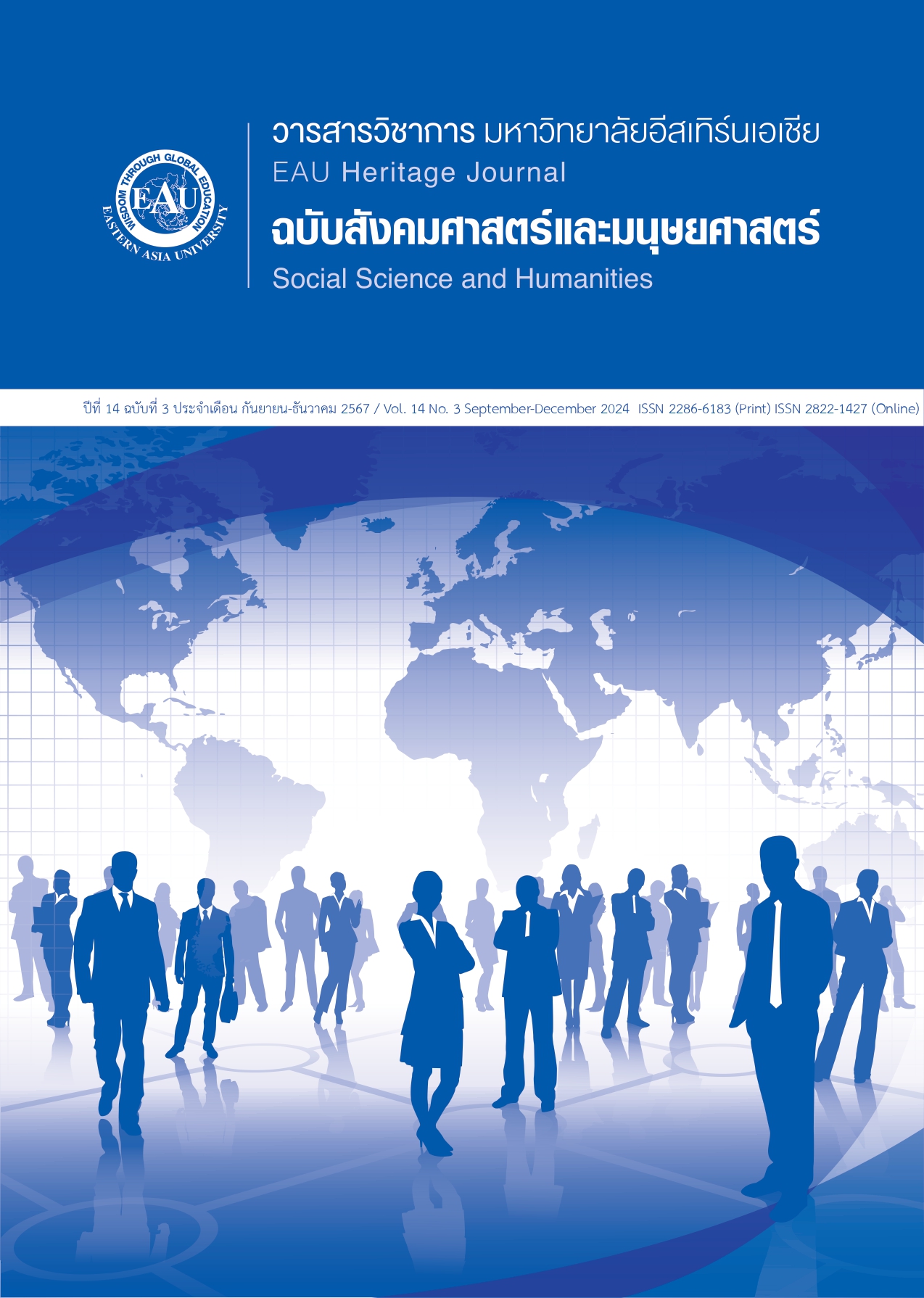Strategies for Promoting Good Characters According to Islamic Principles to Students at Private Schools Teaching Islam
Keywords:
Promoting good character traits, Islam Private, schools teaching IslamAbstract
Strengthening the character of good people according to Islamic principles is very important. which this research study The objectives are (1) to study the current and desired conditions (2) to propose strategies for school administration. to strengthen the characteristics of good people according to Islamic principles for students at private schools teaching Islam. (3) examine the appropriateness of implementing the strategy. the researcher used a mixed methods research technique. tools include: Questionnaires and interview. the population and sample included schools under the Office of the Private Education Commission. special policy school work groups from all over the country There were 260 affiliated schools. the researcher used the formula for calculating the sample size of Krejcie and Morgan (1970, pp. 607-610), using a table to determine the sample size of 160 schools nationwide, and the respondent was the director. school 640 deputy directors, teachers and school committee chairs from 160 schools, data analysis included mean, standard deviation. and the priority index of essential needs. the tools used to collect data are interviews, questionnaires and focus groups from experts with content analysis of the strategy draft. the results of the research found that 1) the present condition and the desired condition, it was found that the average of the desired condition was higher than the present condition in every aspect and every item. 2) the strategy for enhancing good character according to Islamic principles was found to have 5 main strategies, 14 secondary strategies. 3) checking the appropriateness of strategy implementation Every designated primary and secondary strategy is suitable to be used. it can be seen that the development of the curriculum must begin with the development of teachers and teaching and learning. this is the main principle of school administration that is generally accepted.
References
Azzamadi & Muhammad. (2020). Guidelines for developing the administration of Assalam network Schools according to the concept of good Muslim characteristics. Bangkok: Chulalongkorn University Theses and Dissertations (Chula ETD). 4404. (in Thai)
Ahyani, H., & Slamet, M. (2021). Building the values of Rahmatan Lil'Alamin for Indonesian economic development at 4.0 era from the perspective of philosophy and Islamic Economic Law. Al-Ihkam: jurnal hukum & pranata social, 16(1), 111-136.
Alecso. (2014). Preparing Arab youth to the labor market: A strategy to include entrepreneurship and 21st century skills in Arab education. Tunisia: PWC.
Binkley, M., Erstad, O., Herman, J., Raizen, S., Ripley, M., Miller-Ricci, M., & Rumble, M. (2012). Defining twenty-first century skills. In B. M. P. Griffin, & E. Care (Ed.), Assessment and teaching of 21st century skills (pp. 17-66). New York: Springer.
Cropley, A., & Knapper, C. (2021). Lìelong learning in higher education. London: Routledge.
Charoenwongsak, K. (2011). Strategic proposals for educational reform seminar on crises and opportunities for reforming education and Thai society Siam City Hotel. Bangkok: National Education Office. (in Thai)
Dakir, J., Othman, M., Tamuri, A., Stapa, Z., Yahya, S., & Maheran, S. (2015). Islamic education and level of character internalization of secondary school students in Malaysia. Mediterranean journal of social sciences, 6(4), 602-613.
Eryandi, K., & Nuryanto, A. (2020). 21st Century skills of life career skills in productive learning of vocational high school of technical expertise engineering in Yogyakarta City. American journal of educational research, 8(7), 480-484.
Khalil, A. (2016). The Islamic perspective of interpersonal communication. Journal of Islamic studies and culture, 4(2), 22-37.
Krejcie, R. V., & Morgan, D. W. (1970). Determining sample size for research activities. Educational and psychological measurement, 30(3), 607-610
Leelawattananan, N. (2012). What is strategy?. Retrieved from http//:www. Boc.dip.go.th/index.php?Option=com_content&view=article&id=344&Itemid=14
(in Thai)
Ministry of Education. (2003). Islamic studies curriculum 2003. Bangkok:
Ministry of Education. (in Thai)
Ministry of Education. (2008). Basic education core curriculum, B.E. 2008. Bangkok: Agricultural Cooperative Assembly Press of Thailand Limited. (in Thai)
Massie, J. L., & Douglas, J. (1981). Management: A contemporary introduction. (3rd ed.). New Jersey: Englewood Cliffs.
Mispani, M., Abrori, M. S., Hasyim, U. A. A., Kushendar, K., & Muslimah, M. (2021). Higher order
thinking skills (HOTS) and lower order thinking skills (LOTS) on UM-PTKIN Questions on
islamic religious education materials. Jurnal Iqra': Kajian Ilmu Pendidikan, 6(2), 239-260.
Mc Clelland, D. C. (1961). The achievement society. New York: The Free Press.
Mckillip. (1987). Needs analysis for the human services and educations. California: SAGE
Publication.
Muhammad Afifi Azzalihi et al. (2020). Guidelines for developing the administration of Assalam Network Schools according to the concept of good Muslim characteristics. Faculty of Education, Chulalongkorn University. (in Thai)
Muhammad Rafli Wahama et al. (2021). Desired characteristics in the 21st century of Islamic studies learners in private Islamic Schools in Thailand Faculty of Islamic Sciences Prince of Songkla University. Journal of information and learning, 32(2), 40-50. (in Thai)
Muhammad Abdullah Al-Khatib (Complete (Ya'qub) Sueb Sukha Translation). (2011). 10 Steps to becoming a Muslim. Bangkok: Quality. (in Thai)
Nurhikmah, B., & Elihami, E. (2021). The concept of worldwide education in the review of
Islamic education. Journal Edukasi Nonformal, 2(1), 10-17.
Pithiyanuwat, S., & et al. (2018). Vision of Thai education in the future. Sripatum journal 1, 1 (July-December) 1. (in Thai)
Robbin, S. P., & Coulter, M. (2005). Management. (8th ed.). Prentice Hall.
Sirithrangsri, P., & Kamdit, S. (2017). Strategies for developing the desired characteristics of learners in basic educational institutions in the 21st century. Suthiparitat, Year 31, Issue 100. October-December 2017. (in Thai)
Siribannapitak, P. (2009). Concepts and principles of strategic planning (Strategic Planning). Bangkok: Phrik Wan Graphic. (in Thai)
Teerathit, S. (2013). Strategies for developing desirable characteristics of Asean citizens. Bangkok: Srinakharinwirot University. (in Thai)
Trilling, B., & Fadel, C. (2009). 21st century skills: Learning for life in our times. California, CA: John Wiley & Sons.





